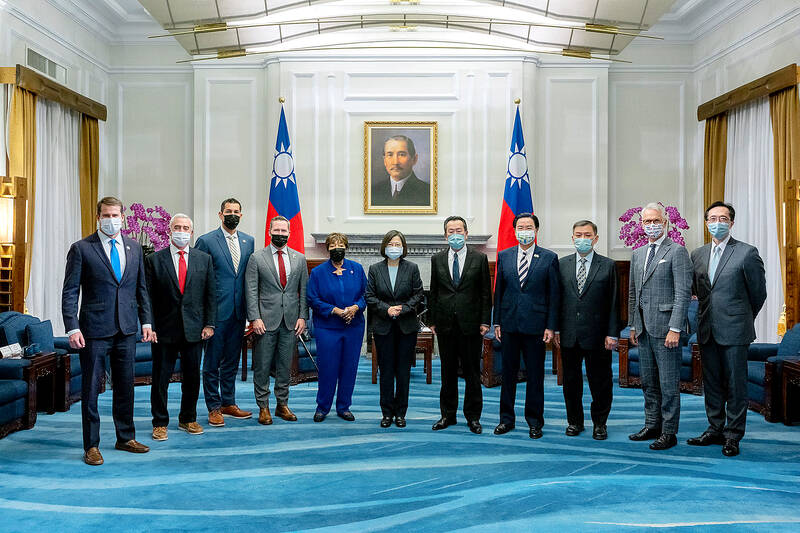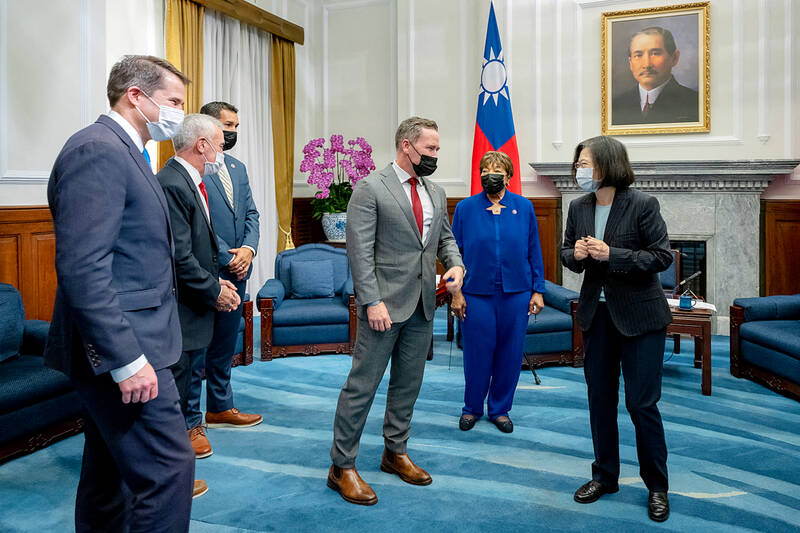The US’ commitment to the security of the Indo-Pacific region is “stronger than ever,” US Representative Eddie Bernice Johnson said during a meeting with President Tsai Ing-wen (蔡英文) in Taipei yesterday.
“I am in Taiwan ... to remind the world that our commitment and shared responsibility for a free and secure Indo-Pacific region remains stronger than ever,” said Johnson, who arrived on Sunday for a four-day visit and took part in Double Ten National Day celebrations in Taipei on Monday.
Describing Taiwan as “a vital trading partner” for the US and its allies, Johnson, who is chairwoman of the US House of Representatives Science, Space and Technology Committee, said that the US-Taiwan relationship is “essential to our national and economic security.”

Photo courtesy of Taiwan Presidential Office
The Democratic lawmaker from Texas also said that she looked forward to strengthening the bond between Taiwan and Texas, and “continuing my dialogue with President Tsai to create even more opportunity and a better future for our countries.”
She mentioned in particular a plan by GlobalWafers Co (環球晶圓) to invest US$5 billion to build a plant in Sherman City, Texas, creating an estimated 1,500 jobs.
Johnson also said she discussed with Taoyuan Mayor Cheng Wen-tsan (鄭文燦) and other officials the possibility of Taiwan Taoyuan International Airport joining the US Customs and Border Protection’s preclearance program.

Photo courtesy of Taiwan Presidential Office
Under the program, US customs officers are stationed at designated airports to screen travelers before they board US-bound flights, allowing them to bypass some inspections upon arrival.
Adding Taoyuan airport would make travel between Taiwan and the US smoother, as well as enhance communication and safety, Johnson said.
Also joining Johnson in the meeting with Tsai were four other US representatives, who arrived in Taiwan on Tuesday for a three-day visit — Democrats Seth Moulton and Kai Kahele, and Republicans Brad Wenstrup and Michael Waltz.
Echoing Johnson’s comments, Moulton said the relationship between Taiwan and the US is founded on the shared values of freedom, democracy and the rule of law.
“We look forward to strengthening and deepening the economic partnership between Taiwan and America,” he said.
As a soldier, Moulton said he learned to stand up for shared values.
Just like Ukrainians, Taiwanese are brave enough to defend their freedoms, he said, adding that he is honored to stand beside them.
Meanwhile, Tsai said Taiwan was willing to further deepen cooperation with the US and all democratic partners to contribute to regional and global peace and stability.
She also expressed hope that the visiting US lawmakers would continue to support Taiwan in the US Congress and back the signing of a double taxation avoidance agreement.
The Ministry of Finance in July said that Taipei and Washington had inked taxation-related deals, such as a transportation income tax agreement in 1988.
However, the two countries have not entered into a comprehensive and reciprocal tax treaty that includes the reduction or elimination of double taxation on individuals and businesses with operations in each other’s country, the ministry said.

CHAOS: Iranians took to the streets playing celebratory music after reports of Khamenei’s death on Saturday, while mourners also gathered in Tehran yesterday Iranian Supreme Leader Ayatollah Ali Khamenei was killed in a major attack on Iran launched by Israel and the US, throwing the future of the Islamic republic into doubt and raising the risk of regional instability. Iranian state television and the state-run IRNA news agency announced the 86-year-old’s death early yesterday. US President Donald Trump said it gave Iranians their “greatest chance” to “take back” their country. The announcements came after a joint US and Israeli aerial bombardment that targeted Iranian military and governmental sites. Trump said the “heavy and pinpoint bombing” would continue through the week or as long

TRUST: The KMT said it respected the US’ timing and considerations, and hoped it would continue to honor its commitments to helping Taiwan bolster its defenses and deterrence US President Donald Trump is delaying a multibillion-dollar arms sale to Taiwan to ensure his visit to Beijing is successful, a New York Times report said. The weapons sales package has stalled in the US Department of State, the report said, citing US officials it did not identify. The White House has told agencies not to push forward ahead of Trump’s meeting with Chinese President Xi Jinping (習近平), it said. The two last month held a phone call to discuss trade and geopolitical flashpoints ahead of the summit. Xi raised the Taiwan issue and urged the US to handle arms sales to

A magnitude 5.6 earthquake struck off the coast of Yilan County at 12:37pm today, with clear shaking felt across much of northern Taiwan. There were no immediate reports of damage. The epicenter of the quake was 16.9km east-southeast of Yilan County Hall offshore at a depth of 66.8km, Central Weather Administration (CWA) data showed. The maximum intensity registered at a 4 in Yilan County’s Nanao Township (南澳) on Taiwan’s seven-tier scale. Other parts of Yilan, as well as certain areas of Hualien County, Taipei, New Taipei City, Taoyuan, Hsinchu County, Taichung and Miaoli County, recorded intensities of 3. Residents of Yilan County and Taipei received

Taiwan has secured another breakthrough in fruit exports, with jujubes, dragon fruit and lychees approved for shipment to the EU, the Ministry of Agriculture said yesterday. The Animal and Plant Health Inspection Agency on Thursday received formal notification of the approval from the EU, the ministry said, adding that the decision was expected to expand Taiwanese fruit producers’ access to high-end European markets. Taiwan exported 126 tonnes of lychees last year, valued at US$1.48 million, with Japan accounting for 102 tonnes. Other export destinations included New Zealand, Hong Kong, the US and Australia, ministry data showed. Jujube exports totaled 103 tonnes, valued at